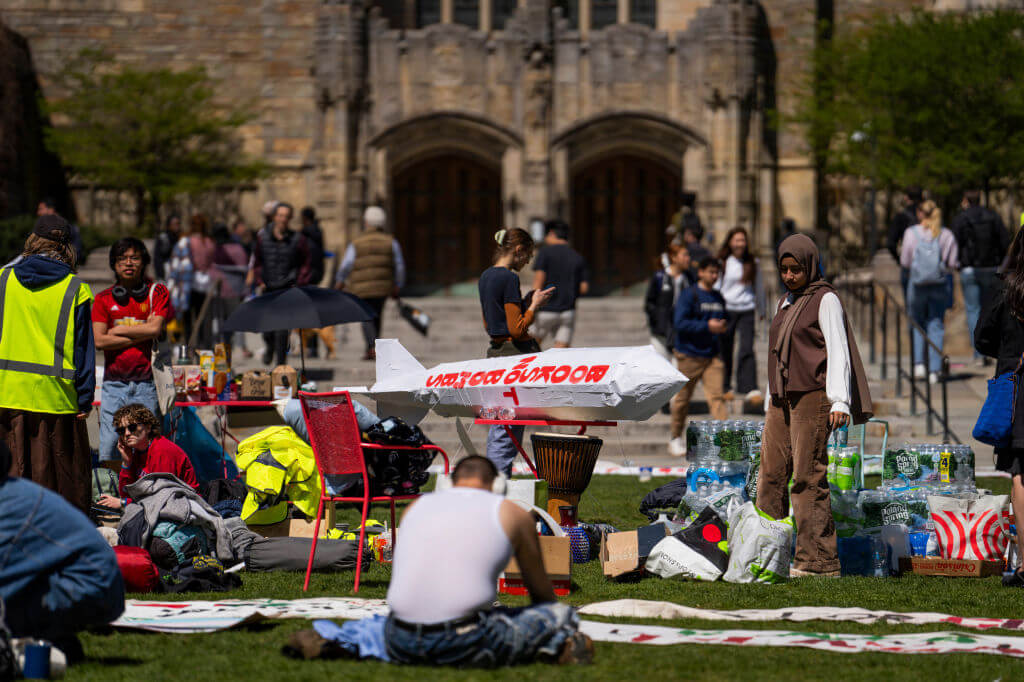Israel Fears Isolation, Sanctions Over Fence
WASHINGTON — Bracing for a ruling against its separation fence by the World Court — which could pave the way for South Africa-style international sanctions — Israel and its allies here are considering a campaign to discredit the court as a biased organ of the United Nations.
The proposed campaign is highly controversial even among Israel’s top strategists, who acknowledge that it could alienate moderates and liberals who view the court with respect. Nonetheless, the move is seen by some senior advisers as an inevitable last step if the court rejects Israel’s arguments and rules the fence a violation of international law, something most observers consider all but certain.
“The case is a foregone conclusion,” said legal expert Alan Dershowitz, who returned last week from Jerusalem, where he was advising officials on confronting the court. “Israel’s going to lose. The only question is whether it will lose unanimously, and there is a substantial chance it might.”
Dershowitz said friends of Israel should “be prepared to expose this court for what it really is,” adding that “it would be insulting to kangaroos to call it a kangaroo court.”
The Bush administration, which takes a dim view of international tribunals but does not approve of the fence, has not yet decided if it would support such a campaign, several sources said.
The court, formally known as the International Court of Justice, was asked by the U.N. General Assembly on December 8 to rule on “the legal implications of building a wall in occupied Palestinian territory.” The 15 justices are scheduled to hear arguments in the Hague on February 23. The court will hear the case in an “advisory” mode, which means the ruling will not be binding in international law as some of its rulings are.
However, if the court advises the U.N. that the barrier violates international law, as expected, the U.N. may move to impose sanctions on the Jewish state. Israel’s justice minister, Yosef Lapid, warned Sunday that Israel may find itself isolated internationally if the fence is not rerouted to follow Israel’s pre-1967 border.
Lapid warned that the court hearing will be the beginning of a process that “will turn Israel into an apartheid-era South Africa.” Lapid spoke at the cabinet’s weekly meeting, which is closed to the media but is routinely leaked to the Israeli press. “I am afraid that we will be boycotted in every international forum,” Lapid was quoted as saying.
The anti-World Court campaign is envisioned as the third stage in a three-stage Israeli response. In the first stage, Israel will argue in a brief to be filed by January 30 that the court has no jurisdiction in this matter. Second, Israel will also argue that on the merits, the fence is legally, morally and politically justified, sources said.
Israel’s legal response team, headed by a former U.N. ambassador, Meir Rosenne, had initially considered boycotting the proceedings altogether but rejected that option, sources said. Some strategists are now arguing that Israel should walk away from the proceedings if the court rejects the argument that it has no jurisdiction. Others, however, argue that the hearing should be used as a podium to expose Israel’s plight in combating Palestinian terrorism. Several observers predicted that this path would be adopted.
Sources said Jerusalem was seeking support from the Bush administration at all three stages: arguing against the court’s jurisdiction, defending the fence’s legitimacy and campaigning against the court itself.
Israel is most likely to receive full American backing on the question of jurisdiction, said diplomats and legal scholars. America has a clear interest in keeping the court away from the fence because of the precedent it might set in regard to Washington’s own counter-terrorism actions in Iraq, Afghanistan and elsewhere, according to Israeli and American sources.
“If the court were to start taking up legal questions that have very strong political overtones, such as this one, that would be very problematic for the United States,” said Cornell Law School international law expert David Wippman, who directed the National Security Council’s Office of Multilateral and Humanitarian Affairs in the Clinton White House.
From Israel’s point of view, “if the ICJ rules that it does have jurisdiction over the fence, it means that everything Israel does in the territories is subject to U.N. oversight, and you can imagine the implications,” said a pro-Israel activist in Washington. “That has huge repercussions.”
Diplomats and legal experts concur, however, that the court is very unlikely to agree with the claim that it is not authorized to consider the issue. Moreover, court sources said there will not be a separate discussion on the issue of jurisdiction, as Israel hoped. A court official, speaking from the Hague on condition of anonymity, said: “States are free to say whatever they want and to dismiss the jurisdiction of the court … but we don’t have a separate phase” to discuss such arguments. Therefore, once the court dismisses the challenges to its jurisdiction, it move right on to discuss the merits of the case.
On the merits of the fence, American support will not be easy to obtain. President Bush himself has spoken against the fence repeatedly, calling it “a problem” and “a wall snaking through the West Bank.” Secretary of State Colin Powell, coming closest to making a legal case against the fence, said: “If you want to put a fence on something that is a recognized border, then put a fence on your property line. But the more you intrude in Palestinian areas… that would prejudge subsequent negotiations as to what a Palestinian state may look like, that’s a problem.”
Well-placed American sources said that while the administration views the fence’s route as legally and politically questionable, it had not decided yet what position it would take in court.
Still less clear is how far Washington will go in helping to discredit the world court. Israel has been reluctant to criticize the institution in public, and America is not considered likely to take a harsher position.
Several Israeli officials and pro-Israel lobbyists said that given the sensitivity of the issue, they expect American friends of Israel to be instrumental in advancing the message.
Dershowitz, speaking with the Forward from his office at Harvard Law School, said that “supporters of Israel have to be prepared to expose this court for what it is.” Dershowitz characterized the court as “a General Assembly court, no more than the General Assembly with robes and wigs, and therefore not any more credible” than the assembly itself. Democracies such as America, Britain and Israel, he said, should consider whether they ought to “give credibility to this court by filing a brief, sending a judge — that’s a hard tactical question.”
Dershowitz said he would advise Israel to fight the world court in the same manner that it fights outrageous General Assembly resolutions such as the one equating Zionism with racism. “This court reminds me of the Southern courts in the 1930s and 1940s,” which “could do justice in a lawsuit brought by a white against a white, but did horrible racist injustices in cases involving whites against blacks,” Dershowitz said. In the same manner, the world court “can do a wonderful job in a border dispute between Sweden and Norway, but when it comes to anything having to do with the Middle East it has zero credibility, and nobody should take seriously any conclusion it reaches with regards to Israel.”
But Dershowitz’s opinion of the court does not seem representative of the general view among international law experts, most of whom called it a “sober” and “independent” panel that stands apart from the governments it represents.
One leading expert, John Norton Moore of the University of Virginia School of Law, said that while it was “inappropriate” for the General Assembly to involve the court in what he considers a legitimate Israeli counter-terrorism action, the court “is taken quite seriously as a very important institution, and we have an interest, globally, to try and strengthen it.” Therefore, Moore said, Israel would be ill-advised to follow a strategy of discrediting the court.
Kenneth Roth executive director of Human Rights Watch, said the fence case in particular “is not a good case to attack the court on because Israel’s position on its merits is weak. Attacking the court would be seen as a further sign of weakness.”

I hope you appreciated this article. Before you go, I’d like to ask you to please support the Forward’s award-winning journalism this Passover.
In this age of misinformation, our work is needed like never before. We report on the news that matters most to American Jews, driven by truth, not ideology.
At a time when newsrooms are closing or cutting back, the Forward has removed its paywall. That means for the first time in our 126-year history, Forward journalism is free to everyone, everywhere. With an ongoing war, rising antisemitism, and a flood of disinformation that may affect the upcoming election, we believe that free and open access to Jewish journalism is imperative.
Readers like you make it all possible. Right now, we’re in the middle of our Passover Pledge Drive and we still need 300 people to step up and make a gift to sustain our trustworthy, independent journalism.
Make a gift of any size and become a Forward member today. You’ll support our mission to tell the American Jewish story fully and fairly.
— Rachel Fishman Feddersen, Publisher and CEO
Join our mission to tell the Jewish story fully and fairly.
Only 300 more gifts needed by April 30






















